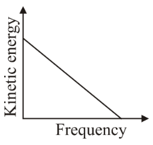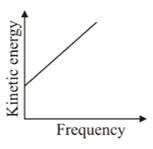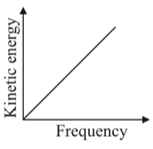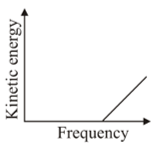EASY
12th Gujarat Board
IMPORTANT
Earn 100
According to Einstein's photoelectric equation, the graph between the maximum kinetic energy of photoelectrons ejected and the frequency of incident radiation is
(a)
(b)
(c)
(d)
42.35% studentsanswered this correctly

Important Questions on DUAL NATURE OF RADIATION AND MATTER
MEDIUM
12th Gujarat Board
IMPORTANT
Light of frequency is incident on a metal surface. Electrons with maximum speed of are ejected from the surface. The threshold frequency for photoemission of electrons is (Given )
MEDIUM
12th Gujarat Board
IMPORTANT
The photoelectric threshold wavelength for silver is. The energy of the electron ejected from the surface of silver by an incident wavelength will be
MEDIUM
12th Gujarat Board
IMPORTANT
A metallic surface is irradiated by a monochromatic light of frequency and stopping potential is found to be . If the light of frequency irradiates the surface, the stopping potential will be
MEDIUM
12th Gujarat Board
IMPORTANT
According to Einstein's photoelectric equation, the graph of kinetic energy of the photoelectron emitted from the metal versus the frequency of the incident radiation gives a straight line graph, whose slope
MEDIUM
12th Gujarat Board
IMPORTANT
The photoelectric cut-off voltage in a certain experiment is . What is the maximum kinetic energy of photoelectrons emitted? Take,
MEDIUM
12th Gujarat Board
IMPORTANT
Light of wavelength is produced by an argon laser which is used in the photoelectric effect. When light from this spectral line is incident on the emitter, the stopping (cut-off) potential of photoelectrons is . Find the work function of the material from which the emitter is made.
MEDIUM
12th Gujarat Board
IMPORTANT
The threshold frequency for a certain metal is . If light of frequency is incident on the metal, predict the cutoff voltage for the photoelectric emission.
MEDIUM
12th Gujarat Board
IMPORTANT
What is the
(a) momentum,
(b) speed, and
(c) de Broglie wavelength of an electron with kinetic energy of .
